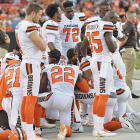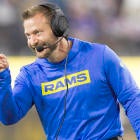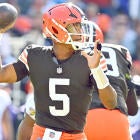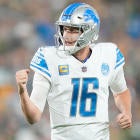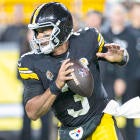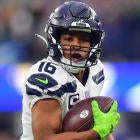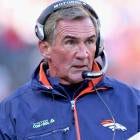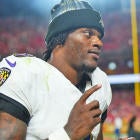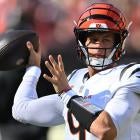Less than a week after Browns coach Hue Jackson mentioned that he didn't necessarily want to see his players protesting during the national anthem, the Browns responded by holding the NFL's largest protest since Colin Kaepernick started kneeling in August 2016.
Nearly a dozen players went to their knee during the national anthem before Cleveland's game against the Giants on Monday. According to the Cleveland Plain-Dealer, Isaiah Crowell, Duke Johnson, Jabrill Peppers, Christian Kirksey, Seth DeValve, Jamie Collins, Kenny Britt, Ricardo Louis and Jamar Taylor were among the players who kneeled during the anthem.
Woah. A ton of Browns kneeling during the national anthem here pic.twitter.com/Qv6qSPs6kX
— Jordan Zirm (@clevezirm) August 22, 2017
The inclusion of DeValve is notable because it makes him the first white player to kneel during the anthem. DeValve's inclusion in the Browns' protest comes in the same week that Chris Long and Justin Britt symbolically joined protests by holding on to the shoulder of their teammates and Derek Carr made a point of putting his arm around Khalil Mack during the anthem.
As for the Browns, there were several players who didn't kneel for the anthem, but did show support for the protest by placing their arms on their teammates. Rookie quarterback DeShone Kizer, Shon Coleman, Britton Colquitt, Jason McCourty and Marcus Martin were all among the group who showed their support while standing.
At halftime of the game, the Browns organization released a statement about the protest.
"As an organization, we have a profound respect for our country's National Anthem, flag and the servicemen and servicewomen in the United States and abroad," the teams said. "We feel it's important for our team to join in this great tradition and special moment of recognition."
Although the team didn't seem too happy about the protest, the organization did say that it would respect every player's decision.
"At the same time we also respect the great liberties afforded by our country including the freedom of personal expression," the team said.
The Browns protest comes less than a week after Jackson had said he was hoping he wouldn't see those issue from his team.
"I think everybody has a right to do, and I get it, but the national anthem means a lot to myself personally, the organization and our football team. I hope -- again I can't speak, I haven't really talked to our team about it -- I would hope that we don't have those issues," Jackson said on August 15.
The Browns coach later clarified his remarks and said he wouldn't be against it if any of his player decided to kneel.
"My personal feeling is that over the last season, we've seen players come under unfair scrutiny for protesting during the anthem, mainly because the focus has become on whether or not a player is being disrespectful to the flag or military and not on the issue and cause attempting to be addressed by the protest," Jackson said in a statement. "The intent of my comments was not to discourage individual expression from our players in light of a cause that moves them to personal expression. I'm disheartened that I gave anyone that impression because I did not speak with enough clarity."
The Browns were kneeling during the national anthem as a way to protest racial injustice and police brutality. The team's decision means Kaepernick's protest is more than likely going to continue in 2017 whether he's in the league or not.








